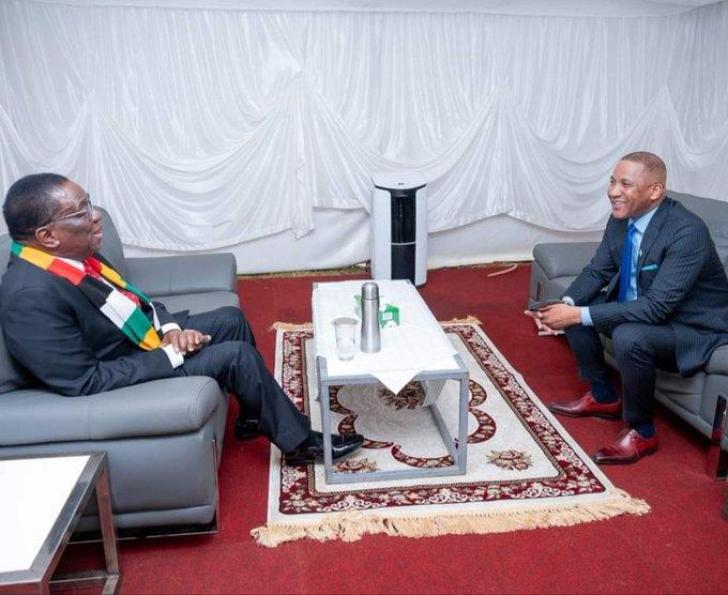News / National
Why Mnangagwa met Botswana's Boko
3 hrs ago | Views

President Emmerson Mnangagwa used the platform of the regional World Children's Day commemoration in Victoria Falls on Saturday to hold a crucial meeting with newly elected Botswana President Duma Boko, signaling efforts to restore and realign diplomatic ties following the ousting of Mnangagwa's ally, former President Mokgweetsi Masisi.
Boko's Umbrella for Democratic Change (UDC) secured a resounding victory over Masisi's Botswana Democratic Party (BDP), which had ruled for 58 years. The unexpected outcome unsettled Mnangagwa, whose initial hesitation to congratulate Boko underscored the strain the election result placed on Zimbabwe-Botswana relations.
A Diplomatic Reset
According to an official present at the Victoria Falls event, the engagement between Mnangagwa and Boko was aimed at recalibrating relations:
"Presidents Mnangagwa and Boko had a good engagement about how their governments and countries should relate after the recent elections. Mnangagwa was deeply hurt by Masisi's defeat but needed to swiftly fix relations with Boko to avoid repeating the diplomatic mistakes he made with Zambian President Hakainde Hichilema."
The two leaders reportedly discussed bilateral cooperation in areas such as trade, border management, security, and economic collaboration. They agreed on the need for regular dialogue and mutual respect, despite their differing political affiliations—Mnangagwa representing a network of former liberation movements and Boko aligning with a rising tide of opposition parties in the region.
Regional Shifts in Power
Boko's victory sent shockwaves across Southern Africa, where liberation movements have long dominated. Zimbabwe's ruling ZANU-PF, Mozambique's FRELIMO, and South Africa's ANC have all seen waning support in recent years. Masisi's loss amplified Mnangagwa's concerns about the growing strength of opposition parties, particularly as his government faces criticism for economic challenges and governance issues.
At Boko's inauguration, Mnangagwa and Masisi were met with boos, while Boko and former Botswana leaders received enthusiastic applause. Zimbabwean opposition figures Nelson Chamisa and Job Sikhala were also present and were warmly received, adding to Mnangagwa's discomfort.
Lessons from Past Missteps
Mnangagwa's strained relationship with Hichilema following Zambia's 2021 elections served as a cautionary tale. After initially mishandling relations with his northern neighbor, Mnangagwa faced challenges in mending the diplomatic fallout. This time, he moved quickly to engage with Boko and avoid further regional isolation.
Shared Interests Amid Political Differences
While the ideological divide remains—Mnangagwa representing entrenched liberation-era politics and Boko championing opposition-driven change—the leaders emphasized pragmatic cooperation. Issues such as border management, trade facilitation, and regional security were prioritized to ensure stability and mutual benefit.
An official summed up the significance of the meeting:
"What happened in Botswana needed to be managed carefully. Mnangagwa and Boko agreed to put their countries first and work together properly going forward. But the dynamics of liberation movements versus opposition parties remain a reality."
The meeting marks a strategic step for Mnangagwa in navigating the region's shifting political landscape while attempting to maintain Zimbabwe's influence and stability amid growing opposition momentum.
Boko's Umbrella for Democratic Change (UDC) secured a resounding victory over Masisi's Botswana Democratic Party (BDP), which had ruled for 58 years. The unexpected outcome unsettled Mnangagwa, whose initial hesitation to congratulate Boko underscored the strain the election result placed on Zimbabwe-Botswana relations.
A Diplomatic Reset
According to an official present at the Victoria Falls event, the engagement between Mnangagwa and Boko was aimed at recalibrating relations:
"Presidents Mnangagwa and Boko had a good engagement about how their governments and countries should relate after the recent elections. Mnangagwa was deeply hurt by Masisi's defeat but needed to swiftly fix relations with Boko to avoid repeating the diplomatic mistakes he made with Zambian President Hakainde Hichilema."
The two leaders reportedly discussed bilateral cooperation in areas such as trade, border management, security, and economic collaboration. They agreed on the need for regular dialogue and mutual respect, despite their differing political affiliations—Mnangagwa representing a network of former liberation movements and Boko aligning with a rising tide of opposition parties in the region.
Regional Shifts in Power
At Boko's inauguration, Mnangagwa and Masisi were met with boos, while Boko and former Botswana leaders received enthusiastic applause. Zimbabwean opposition figures Nelson Chamisa and Job Sikhala were also present and were warmly received, adding to Mnangagwa's discomfort.
Lessons from Past Missteps
Mnangagwa's strained relationship with Hichilema following Zambia's 2021 elections served as a cautionary tale. After initially mishandling relations with his northern neighbor, Mnangagwa faced challenges in mending the diplomatic fallout. This time, he moved quickly to engage with Boko and avoid further regional isolation.
Shared Interests Amid Political Differences
While the ideological divide remains—Mnangagwa representing entrenched liberation-era politics and Boko championing opposition-driven change—the leaders emphasized pragmatic cooperation. Issues such as border management, trade facilitation, and regional security were prioritized to ensure stability and mutual benefit.
An official summed up the significance of the meeting:
"What happened in Botswana needed to be managed carefully. Mnangagwa and Boko agreed to put their countries first and work together properly going forward. But the dynamics of liberation movements versus opposition parties remain a reality."
The meeting marks a strategic step for Mnangagwa in navigating the region's shifting political landscape while attempting to maintain Zimbabwe's influence and stability amid growing opposition momentum.
Source - online






































